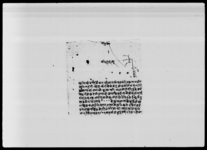A patra from the dharmādhikāra Jānaki Datta Paṇḍita informing officials and reputable men of specified villages that Sadānanda Bhaṭṭa is allowed to grant prāyaścitta (VS 1871)
ID: PN_0035_0053
Edited and
translated by Axel Michaels
in collaboration with
Manik Bajracharya
Created: 2021-01-26;
Last modified: 2023-01-24
For the metadata of the document, click here
The accompanying edition, translation/synopsis and/or commentary are available under the terms of the Creative Commons Attribution-ShareAlike 4.0 International License
Abstract
The dharmādhikāra Jānaki Datta Paṇḍita gives the authority to grant prāyaścitta in the villages of Gajurī, Pyeḍa, Kirācoka,Katuvāla Gāũ and Kalavārī to the priest Sadānanda BhaṭṭaDiplomatic edition
[1r]
1श्रीदुर्गाज्यू1श्री६गुरुज्यू1[In the top-right margin: triśūla symbol]1पत्रसही1स्वस्तिश्रीधर्माधीकार•श्रीजानकीदत्तपंडितकस्यपत्रम्2आगे•गजुरी•प्येडा•कीरांचोक•कटुव़ालगाऊ•कल्ल्यारि
3जग्गाजग्गाका•अमाली•द्वार्या•थरि•भलामानीस्गैह्रके•जथो
4चित्•उप्रॉन्त•ऎतीजग्गाको•प्रायश्चित्तदीनाकोअषतियारि
5सदानन्दभट्टलाईदियाकोछ•तॉहॉतिमिहेरूले•ईन्छेऊ•पु
6स्तककोदक्षिणादि ¯ ¯ ¯ ¯ कोछापलाग्याकोपूर्जिलीप्रा
7यश्चित्तचलाईदिन्यागर•एस्माजोलुकि•छपि•दवि•दवाई•
8वसौलाप्रायश्चित्त•जोगरौन•ऊन्का•घर•स्वाहास्वधाथूनि
9नान•ईतिसम्वत्१८७१सालमीतीभाद्रसुदि५रोज७शुभ्म्
Translation
[1r]
Glorious Durgā
Śrī 6 gurujyū
[In the top-right margin: a trident symbol]
Sender's signature
Hail. (This is) a letter from the dharmādhikāraJānakī Datta Paṇḍita.
Āge: To all the amālīs, dvāres, tharīs, dignitaries and the like of sundry places, namely Gajurī, Pyeḍā, Kīrāṃcoka, Kaṭuvāla Gāũ [and] Kallyāri.1 Yathocita-uprānta: The right to grant absolution (prāyaścitta)2 to [people living in] these places has been given to Sadānanda Bhaṭṭa. Take the dakṣiṇā to him there [in accordance with] the books3 along with a purjī4 bearing the stamp of Śrī 6 Gurujyu5 , and then do prāyaścitta. In this regard, whoever hides himself and suppresses [his misdeeds], and [thus] does not do prāyaścitta, will be banned from performing svāhā and svadhā6 rituals at his house.
Saturday, the 5th of the bright fortnight of Bhādra in the (Vikrama) era year 1871 (1814 CE). (May there be) auspiciousness.
Commentary
Sadānanda Bhaṭṭa, the great-grandson of Sāmbasadāśiva Bhaṭṭa, was a priest from a fallen clan in Deopatan who had lost the right to serve the Paśupatinātha temple (Michaels 2008: 205-6). However, these Bhaṭṭas were conceded the right to organize processions (tīrthayātrā) and grant absolution (prāyaścitta) at certain places.

